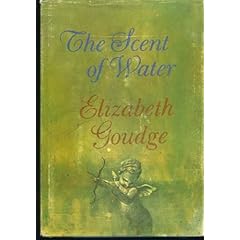
As you know, I'm warding off the holiday evil eye by pretending to be a '60s housewife--and I need a cigarette! Can you believe that I can watch As the World Turns as "I stand here ironing" (a nod to Tillie Olsen), as my mother did? Most of the cleaning products have also been around forever: Comet, Tide, Mr. Clean. Of course, I'm trying to stay roughly in period with my books, but I'm reading some things on the computer (is that cheating?) and overlapping a bit with the '70s.
Here's what I did today:
1. Ignored my housework all morning and sat around in dishabille drinking tea. Finished Elizabeth Goudge's 1963 novel, The Scent of Water. Goudge would be below Virago's "Whipple line" (see Guardian), but I read her with enthusiasm: Green Dolphin Street (reissued by Capuchin Classics and reviewed here) was made into a successful movie, and several of her books were selections of The Literary Guild. Her prose is lyrical, sometimes original, sometimes bordering on sentimental, and I tend to go away from her books feeling revitalized, as though I have taken a brisk walk in the country on a beautiful day.
The Scent of Water, my personal favorite, revolves around the decision of Mary Lindsay, a high-ranking government administrator who has always lived in London, to retire early at 50. She inherits a country house from her cousin, Mary, a brilliant but misunderstood woman who suffered from psychotic depressions (probably bipolar). Our Mary, the heroine, met this cousin only once when she was eight; she wants to live in the country so she can experience this way of life before it disappears entirely from England. Goudge vividly describes the England that is disappearing in the '60s: one of Mary's neighbors, Mr. Baker, the last bodger in England (makes table legs), knew her cousin, and both he and Mary as children refused the gift of a beautiful miniature object from Cousin Mary, believing it belonged with the collection in the country. There is a new urgency to modern living: people live for the now, not sure there will be a tomorrow, and the new generation has no qualms about breaking up collections (nor do Mary and Mr. Baker anymore). She also has a private wish to get to know the dead: John, the fiance who died in the war and whom she didn't love enough then, and Cousin Mary.
There are many, many fascinating characters: Paul, a blind poet and his cruel, self-dramatizing wife, Valerie, a perfectionist/housewife who has grown to dislike Paul for the way of life he has insisted on; Jean, the nervous sister of an intellectual vicar (she, like Cousin Mary, seems to have some mental illness); Mr. and Mrs. Hepplewhite, a shady financier and his kind, lonely, too loquacious lady-of-the-manor wife; Edith, an old-fashioned sprite-ish girl adopted by a very contemporary architect and artist who don't understand her. We also have Mary's diaries, and I must say Goudge does an amazing job describing Mary's bouts with mental illness (I felt that I was reading about Virginia Woolf).
2. Ignored my housework this afternoon, got dressed, and finished Harry Joscelyn by Mrs. Oliphant, an absorbing Victorian novel that would definitely appeal to Trollope fans. Oliphant has a smooth, elegant style, and this is one of her better efforts: the plot centers on Harry, a younger son of a not particularly distinguished family, who rebels and runs away to Italy after his abusive father shuts him out of the house one night. Harry's mother and sharp-witted older sister, Joan, remaini loyal to him; the years pass and Oliphant humorously describes Joan's cranky romance with a besotted older man. She delineates Harry's adventures in Italy: he lands on his feet, though we're surprised by this, as he has only determination going for him, no special skills. Ten years later the youngest daughter, Lyddie, has an opportunity to travel to Europe and is determined to find Harry. The characters are vivid, and the novel reads easily and quickly, though somebody should write something about time in Mrs. Oliphant: there's always something a little off about her scenes, as we'll spend 100 pages on a single day and then skip some years.
3. Cleaned sink and kitchen counters.
4. Cleaned bathroom.
5. Vacuumed.
6. Cooked homemade soup and made rice krispie squares. Now I won't have to cook for the rest of the week!

7. Started reading a Gothic novel, Phyllis A. Whitney's Listen for the Whisperer (1971; I should have found an earlier one). It's a bit pulp fiction-ish, but has a kind of du Maurier tone to it. (Du Maurier is SO overrated.) Fascinating, eerie, but a bit pulpy.
No comments:
Post a Comment